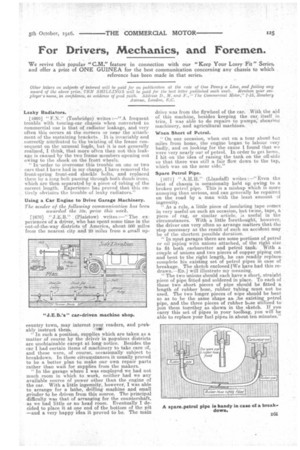For Drivers, Mechanics, and Foremen.
Page 23

If you've noticed an error in this article please click here to report it so we can fix it.
We revive this popular " CM." feature in connection with our "Keep Your Lorry Fit " Series, and offer a prize of ONE GUINEA for the best communication concerning any chassis to which reference has been made in that series.
Other letters on subjects of interest will be paid for on publication at the rate of One Penny a Line, and failing any award of the above prize, TEN SHILLINGS will be paid for the best letter published each week. Mention your employer's name, in confidence, as evidence of good faith. Address D. Al, and F., •• The Commercial Motor," 7-15, flosebery Avenue, London, EX.
Leaky Radiators.
. [1669] " (Tonbridge) writes —"A frequent
trouble with touring-ear chassis when converted to commercial use is that of radiator leakage, and very often this occurs at the corners or near the attachment of the sustaining brackets. It is invariably and correctly attributed to the twisting of the frame consequent on the unusual loads, but it is not generally realized, I think, that more often than not this leakage is caused by the twO frame members opening out owing to the shock on the front wheels.
'In 'order to overcome this. trouble on one or two cars that I have had in my charge, I have removed the front-spring front-end shackle bolts, and replaced them by a long bolt passing through both dumb irons, which are then separated by a piece of tubing of the correct length. Experience has proved that this entirely obviates the trouble of leaky radiators."
Using a Car Engine to Drive Garage Machinery.
The sender of the following communication has been awarded the 10s. prize this week.
[1670] (Plaistow) writes :—" The. ex periences of a driver, who has spent some time in the out-of-the-way districts of America, about 500 miles from the nearest city and 20 miles from a s,mall up
country town, may interest your readers, and prolsably instruct them. "In such a position, supplies which are taken as a matter of course by the driver in populous districts are unobtainable except at long notice. Besides the car I had certain items of machinery to take care of, and these were, of course, occasionally subject to breakdown. In these circumstances it usually proved to be a better plan to make our own repair parts rather than wait for supplies from the makers.
" In the garage where I was employed we had not much room in which to work, neither had we any available source of power other than the engine of the car. With a little ingenuity, however, I was able to arrange for a lathe, drilling machine and small grinder to be driven from this source. The principal difficulty was that of arranging for the countershaft, as we had little or no head room. Eventually I decided to place it at one end of the bottom of the pit —and a very happy idea it proved to be. The main drive was from the flywheel of the car. With the aid of this machine, besides keeping the car itself in trim, I was able to do repairs to pumps,/ shearing machinery, and agricultural machines.
When Short of Petrol.
"On one occasion, when out on a tour about ten miles from home, the engine began to labour very badly, and on looking for the cause I found that we were very nearly out of petrol. In order to get home, I hit on the idea of raising the tank on the off-side so that there was still a fair flow down to the tap, which was on the near side."
Spare Petrol Pipe. L1671] "A.1111." (Lla.ndaff) writes :—" Even the best of chassis is occasionally held up owing to a broken petrol, pipe. This is a mishap which is more annoying than serious, and can generally be repaired on the road by a man with the least amount ingenuity. ' As a rule' a little piece of insulating tape comes in very useful on such an occasion, but twine, tape, a piece of rag, or similar article, is useful in the circumstances. With a little forethought, however, the driver can very often so arrange matters that the stop necessary as the result of such an accident may be of the shortest possible duration.
"In most garages there are some portions of petrol or oil piping with unions attached, of the right size to fit both carburetter and petrol tank. With a couple of unions and two pieces of copper piping cut and bent to the right length, he can readily replace. complete his existing set of petrol pipes in case of breakage. The sketch enclosed [We have had this redrawn.—En.] will illustrate my meaning. "The two unions should each have a short, straight piece of pipe fitted and soldered in place. To each of these two short pieces of pipe should be fitted a length of rubber hose, rubber tubing must not be used. The two longer pieces of nipe should be bent. so as to be the same shape as ;he existing petrol pipe, and the three pieces of rubber hose utilized to loin them together as shown in the sketch. If you carry this set of pipes in your toolbag, you will be able to replace your fuel pipes in about ten minutes."
























